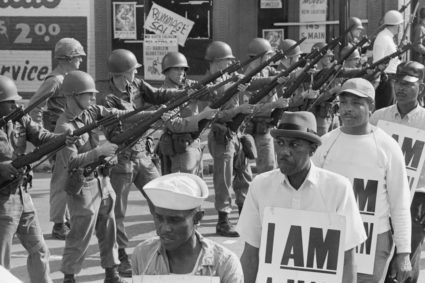
In 2022, there were nearly 33,000 estimated cases and researchers project that cases will rise to more than 36,000 by…

Our September 2020 pick for the PBS NewsHour-New York Times book club is Steven Greenhouse's "Beaten Down, Worked Up." Become a member of the Now Read This book club by joining our Facebook group, or by signing up to our newsletter. Learn more about the book club here.
Elmore Nickleberry was 22 years old when he returned home to Memphis from the Korean War and got a job working for the city's sanitation department. The work was hard and at times demeaning, and Nickleberry, who is Black, said he was treated better overseas than in the segregated South.
Journalist and author Steven Greenhouse met Nickleberry in 2014, while on a reporting trip for The New York Times. Greenhouse had arranged to interview some of the men who took part in the Memphis sanitation workers' Strike of 1968 — the demonstration Martin Luther King Jr. addressed shortly before his death. Nickleberry, now in his 80s, stood out to the long-time labor reporter.
"He was so humble, so kind, so salt of the earth," Greenhouse told the PBS NewsHour. "He was plain-spoken, yet he told one hugely moving story after another."
Greenhouse tells Nickleberry's story in "Beaten Down, Worked Up," his book looking at the factors driving the decline of unions and worker power in the U.S. The Memphis sanitation workers' strike was about more than just adding "a few more dollars" to workers' paychecks, Greenhouse said. "It was about civil rights. It was about dignity. It was about workers being sick and tired of seeing only whites being promoted to supervisor."
Hear more from Greenhouse about his reporting, as well as King's lesson that "all labor that uplifts humanity has dignity," in an annotated excerpt from the book below.
Elmore Nickleberry served proudly in the Korean War as a corporal in the Eighth Armored Division. So he was understandably dismayed with what he encountered upon returning to Memphis, his hometown, in 1953.
"People would call you 'boy,'" said Nickleberry, who was twenty-two years old when he returned. "They'd say, 'Do this, boy. Come here, boy.' They treated me better overseas than I was treated in Memphis." Nickleberry is soft-spoken and disarmingly friendly (1), with short silver- charcoal hair, still fit and trim, even though he is in his eighties.
Like many young African Americans, Nickleberry, the grandson of a slave, found it hard to land a job because blacks, in that Jim Crow era, were typically the last ones hired. His brother Roosevelt worked in the city's sanitation department, and even though Elmore had hoped to find a better job, after eight fruitless months of looking for work, he settled on getting a job there, too. Every morning for three weeks, he stood outside one of the city's sanitation garages, making his availability known, as he watched the big yellow trucks rumble out to the city's neighborhoods.
One morning a foreman finally approached him and said, "Boy, you been here two or three weeks standing outside this gate. You want a job?"
"Yes, sir," Nickleberry said.
The foreman responded, "Come in, boy, I'll give you a job." (2)
He started at seventy-five cents an hour ($6.85 today). (3) That was in July 1954, two months after the Supreme Court decided Brown v. Board of Education, rendering school segregation illegal, and the same month that Elvis Presley gave his first public performance, at a park in Memphis.
For Nickleberry, the new job was humbling. "Everybody called us 'boy,' " he said in an interview six decades later. "The supervisors [all of them white] also called us 'boy.' You'd tell them 'I ain't no "boy." I am a man.' And they'd keep calling you 'boy.' " (4)
Nickleberry was a tub toter. His job was to go into people's backyards, transfer their garbage into a seventeen-gallon, round, plastic tub, and then carry the tub to the truck in the street. The sanitation workers frequently filled their tubs with thirty, even forty pounds of garbage, often carrying the tubs on their backs or shoulders, often on top of their heads. Because the tubs got banged around, "there would often be holes in the tub, and the garbage and maggots would crawl down your back (5) and onto your clothes," Nickleberry recalled, with a scowl. "A lot of the people weren't nice," he said. "They'd say, 'Boy, you left some garbage behind. How about picking that stuff up?' (6) " He hated when homeowners called him "garbage man," as if he were just garbage.
Excerpted from pp. 107-108.
Sustain our coverage of culture, arts and literature.